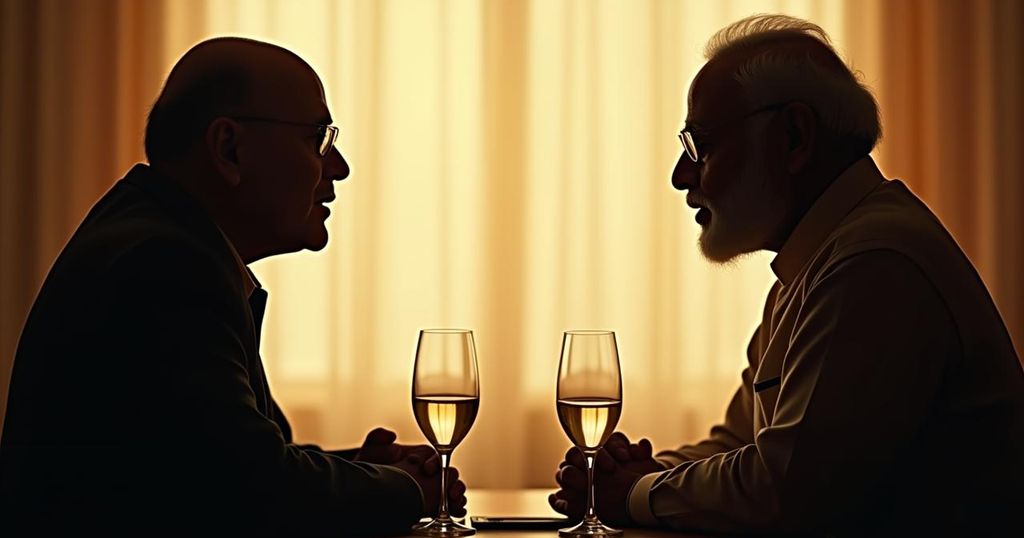Maldives President Mohamed Muizzu is in India for a four-day state visit to seek assistance amidst a looming economic crisis, specifically requesting support for debt repayments and potential currency swaps during meetings with Prime Minister Narendra Modi. The visit reflects a significant shift in Maldives-India relations from past tensions to renewed cooperation.
Maldives President Mohamed Muizzu arrived in New Delhi on October 6, 2024, for a significant four-day state visit, during which he is scheduled to engage in crucial discussions with Prime Minister Narendra Modi on October 7, 2024. The visit comes at a critical time as President Muizzu is faced with a looming economic crisis and upcoming debt obligations for the Maldives. In an interview with an international broadcaster prior to his visit, President Muizzu expressed his hope that India would help alleviate the financial strain faced by the Maldives, indicating an intention to discuss a currency swap arrangement and debt support during bilateral meetings planned at Hyderabad House, following a ceremonial guard of honor at Rashtrapati Bhawan. “India is fully cognizant of our fiscal situation, and as one of our biggest development partners, will always be ready to ease our burden, find better alternatives and solutions to the challenges we face,” stated President Muizzu in a written interview with the BBC. In September, India had proactively announced that the State Bank of India would purchase Maldivian government bonds amounting to $50 million, a crucial move to stave off an imminent financial crisis. President Muizzu is anticipated to renew requests for further Indian assistance through currency swaps and potential debt waivers, especially after reaching an agreement with China for a five-year deferment of loan repayments. On October 8, the Maldives is set to make a $25 million payment as part of its $500 million Sukuk (Islamic bonds) debt obligation, with $114 million remaining due within the year and approximately $1.5 billion over the next two years. The Maldives is grappling with a high debt-to-GDP ratio of about 110%, declining foreign exchange reserves at approximately $440 million, and recent downgrades from credit rating agencies Moody’s and Fitch. Should the Maldives default on the upcoming payments, it may plunge into a crisis reminiscent of Sri Lanka’s situation in 2022. On October 6, External Affairs Minister S. Jaishankar, Foreign Secretary Vikram Misri, and other key officials engaged with President Muizzu to prepare for the forthcoming discussions. These talks are poised to result in various memoranda of understanding concerning Indian infrastructure projects, security cooperation, and broader bilateral efforts. In a post on social media, Minister Jaishankar expressed optimism that President Muizzu’s dialogue with Prime Minister Modi would “give a new impetus” to India-Maldives relations. Additionally, Maldives’ newly appointed Foreign Minister Abdulla Khaleel conveyed confidence that this visit would enhance the enduring friendship and cooperation signified between the two nations. President Muizzu’s current visit marks a notable transformation in Maldives-India relations, shifting from the tensions experienced over the past year. After campaigning on an “India Out” stance that demanded the withdrawal of Indian military personnel from the Maldives by May, President Muizzu’s diplomatic approach appears to be evolving. He did not initially choose India as his primary bilateral visit destination, instead traveling to Turkey, UAE, and China. The relationship was further strained by critical commentary from Maldivian ministers regarding Prime Minister Modi, which negatively affected Indian tourism to the Maldives. However, following multiple ministerial discussions and the Indian government’s successful military withdrawal, relations have improved, prompting President Muizzu to dismiss ministers who contributed to the discord. While President Muizzu’s visit had been anticipated for some time, delays related to the Maldives’ economic challenges and a cabinet reshuffle following the resignation of the previous Finance Minister had postponed his travel. The newly appointed Finance Minister, Moosa Zameer, previously held the role of Foreign Minister and had visited Delhi in May. Following his engagements in India, President Muizzu and his delegation plan to continue their visit to Agra and Mumbai on October 8 and to Bengaluru on October 9.
The current economic climate in the Maldives is precarious, characterized by a significant rise in external debt and unsustainably high debt levels relative to GDP. Over recent months, concerns about the country’s financial health have intensified, particularly with upcoming debt repayments coinciding with dwindling foreign exchange reserves. Maldives’ external relations, particularly with India, which has historically been one of its key development partners, are undergoing a reevaluation. The political landscape within the Maldives also features a transition in governance marked by a shift in rhetoric regarding India, complicating the dynamics of bilateral interactions. President Muizzu’s visit seeks to not only address these pressing financial issues but also to mend foreign relations while ensuring the support of international partners, particularly India, at this critical juncture.
In conclusion, President Mohamed Muizzu’s state visit to India underlines the urgent need for assistance as the Maldives grapples with significant economic challenges amidst impending debt repayments. The discussions with Prime Minister Modi could potentially yield vital support in the form of currency swaps and debt waivers, crucial for the Maldives’ economic stability. Furthermore, this visit represents a strategic pivot in Maldives-India relations, moving from prior tensions towards fostering a collaborative partnership moving forward, highlighted by mutual economic interests and cooperation in various domains.
Original Source: www.thehindu.com






